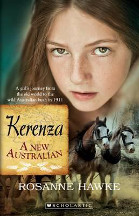Kerenza by Rosanne Hawke

New Australian series. Scholastic, 2015 ISBN 9781742990606
(Age recommended Upper Primary and Lower Secondary students) The
opportunity to farm their own land in Australia is the driving force
behind Kerenza's poor family leaving Cornwall in 1911, to take up a
selection in the South Australia's Mallee country. Kerenza knows
little of what awaits, yet leaving her older sister, her
Grandmother, friends and home causes her great distress.
Despite her misgivings, as an obedient and caring daughter, Kerenza
tries hard to be positive, knowing that her parents depend upon her
to assist with the endless work and caring for her younger siblings.
Having an Uncle and cousins Jacob and Harry already living in
Adelaide makes the transition slightly easier for the family as they
work together to establish themselves in this strange new land.
Kerenza however is confused and unimpressed by Jacob's unpleasant,
taunting behaviour.
Even travelling to their new farm in the Swan Reach area is an
arduous undertaking, with the possessions of two families carted on
a heavily laden dray at walking pace. Upon arrival in the area, the
men must fell trees to create a track just to gain access to their
land grant where the real work of clearing mallee scrub must be
completed before the crops can be sown.
Every aspect of daily life is difficult, from consuming limited
foodstuffs cooked in a makeshift kitchen to struggling to maintain
hygiene with limited water whilst living under canvas.
This simple story describes the everyday difficulties and trying
circumstances faced by settlers attempting to survive under severe
climatic conditions. A terrible drought ruins crops and would have
destroyed the prospects of many migrants of the time, yet with
fortitude, hard work and a great deal of luck, many prospered.
As often happens in historical fiction, the author assigns modern,
progressive values and informed attitudes to certain characters
which detracts from their authenticity. The tendency to do so is
understandable however as it is necessary to foster less bigoted
views on race relations, social welfare and environmental concerns
in young readers.
The narrative style is refreshing with the author refraining from
employing excessive and unnecessary drama in the presentation of
rural life just prior to the First World War. This story is suitable
for Upper Primary and Lower Secondary students.
Rob Welsh